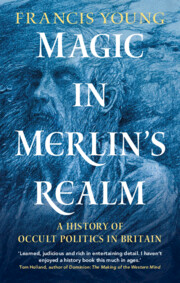Book contents
- Magic in Merlin’s Realm
- Reviews
- Frontispiece
- Magic in Merlin’s Realm
- Copyright page
- Dedication
- Contents
- Plates
- Preface
- Introduction
- 1 ‘Britain Indulges in Magic’
- 2 The Secrets of the King
- 3 Arthurian Dynasty
- 4 House of the Unicorn
- 5 Politics and the Decline of Magic, 1649–1714
- 6 Emanations of Albion
- Conclusion
- Bibliography
- Index
- Plate Section (PDF Only)
2 - The Secrets of the King
Occult and Royal Power in Medieval Britain
Published online by Cambridge University Press: 07 February 2022
- Magic in Merlin’s Realm
- Reviews
- Frontispiece
- Magic in Merlin’s Realm
- Copyright page
- Dedication
- Contents
- Plates
- Preface
- Introduction
- 1 ‘Britain Indulges in Magic’
- 2 The Secrets of the King
- 3 Arthurian Dynasty
- 4 House of the Unicorn
- 5 Politics and the Decline of Magic, 1649–1714
- 6 Emanations of Albion
- Conclusion
- Bibliography
- Index
- Plate Section (PDF Only)
Summary
Medieval monarchs feared political sorcery as a form of treason, but monarchs themselves were also accused of using magic, and several kings became intensely interested in the political and financial potential of occult traditions. Beginning in the twelfth century, rulers began to show interest in the political potential of astrological prognostications, although it was not until the fourteenth century that accusations of political sorcery first burst onto the scene in England. A succession of occult royal advisers, including Roger Bacon and George Ripley, attempted to assume the mantle of Merlin and counsel England’s kings, while Richard II went beyond other monarchs in defining himself as a royal magus. Medieval kings attempted to draw on occult knowledge for both warfare and financial aid in the Hundred Years’ War. Alchemists strove in vain to cure Henry VI of mental illness, while accusations of magic against the wife of Humphrey, duke of Gloucester destabilised the nation. During the Wars of the Roses, politically motivated accusations of sorcery played a key role in the rise of Richard III. The chapter highlights the ambiguity of magic and occult traditions in medieval politics, and their uses both positive and negative in the arts of politics.
- Type
- Chapter
- Information
- Magic in Merlin's RealmA History of Occult Politics in Britain, pp. 85 - 137Publisher: Cambridge University PressPrint publication year: 2022

